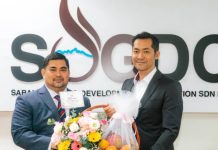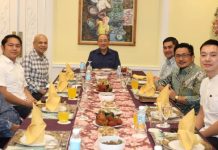KOTA KINABALU: The State Government has decided that the Rapid Test Kit (RTK) antigen test cost should not be more than RM60 for international flight arrivals at the Kota Kinabalu International Airport (KKIA).
“The State Government agrees that RM160 for each test is too high so we have decided that it should not be more than RM60,” said Chief Minister Datuk Seri Panglima Haji Hajiji Haji Noor.
At the Federal level, the cost would be RM100 for Malaysian and RM160 for non- Malaysian to do RTK-antigen test arriving on international flights.
“However, we in Sabah decided that it will cost not more than RM60 for all international arrivals. This is the most suitable and will be a relief to the visitors. After more than two years we are now very eager to welcome tourists to come,” he said.
The Chief Minister was responding to the Malaysian Association of Tour and Travel Agents (MATTA) President Datuk Tan Kok Liang’s plea on the cost of the tests imposed for international arrivals.
Earlier, Hajiji said the State Government through Sabah Tourism Board (STB) is aggressively pursuing the resumption of more than 200 direct international into Sabah, as the country opens up its international border beginning April 1.
He said that following the opening of the border, tourism players needed to capitalise on Sabah’s strategic location to attract more airlines to the state.
He was happy to note that the STB was working with airlines to assist them in reestablishing direct flights for domestic and international travel. Before the pandemic, the Kota Kinabalu International Airport has managed 236 direct international flights from 22 cities, he said at the launching of the Travel Safe Alliance Malaysia (TSAM) in Sabah at the Sabah International Convention Centre (SICC) here on Thursday.
Hajiji also noted that the STB has cooperated with tourism industry players to hold virtual engagements, travel expos, promotion, and training on destination updates such as re-establishing trade and tourist confidence with many countries.
“I urge industry players and stakeholders to work together to ensure that Sabah’s tourism rises to its former glory and remains as one of Malaysia’s favourite tourism destinations,” he said.
The Chief Minister said the TSAM certification programme in Sabah complemented the State Government’s efforts and strategies to revitalise the tourism industry by promoting Sabah as a trusted, safe and attractive tourist destination.
“The 53 recipients of the TSAM certification today will encourage more tourism players into the fold. The greater hope is that the certification will bring a new chapter to Sabah tourism.
“I thank TSAM for its leadership role. The government welcomes collaboration; partnerships and alliances such as TSAM’s. We are confident that this certification initiative will spur domestic and international travels,” he said.
TSAM is a partnership among four key players within the tourism industry, namely the Malaysian Association of Tour and Travel Agents (MATTA), Malaysian Association of Hotels (MAH), Malaysian Association of Convention and Exhibition Organisers and Suppliers (MACEOS), and Malaysia Aviation Group (MAG).
TSAM has established a comprehensive safe travel solution certified by Bureau Veritas Certification Malaysia that was launched by the Minister of Tourism, Arts and Culture, Dato Sri Hajah Nancy Shukri, in Langkawi on October 10 last year.
Hajiji said he accepted the invitation from MATTA President Datuk Tan Kok Liang to launch the TSAM in Sabah because he shared a similar determination with Tan to see that Sabah is well set and ready on April 1 this year.
“Two days ago, we marked the one-year anniversary of our five-year development blueprint – the Hala Tuju Sabah Maju Jaya – which was mooted by the GRS-BN state government on March 29, 2021, to steer our economy through and out of the challenges brought on by the COVID-19 pandemic and beyond.
“We have persevered, we have come this far and we have put plans into action,” he
said.
According to him, the announcement by Prime Minister Dato’ Sri Ismail Sabri Yaakob
on the reopening of Malaysia’s borders was a welcomed relief and especially to the tourism industry.
Like most countries, the pandemic has impacted Sabah’s tourism industry and many tourism operators have been forced to close shop due to the closure and restriction of flights in and out of Sabah, he said.
To cushion the impact, he said the State Government had disbursed RM10 million in grants to benefit more than 500 tourism projects, including financial assistance to hotels and homestays, tour operators, tour guides, and incentives to encourage domestic and MICE tourism activities, among others.
Also being put in place was the Sabah Tourism Recovery Plan for domestic and international segments to promote tourism, including market shifting during the pandemic.
In moving forward, Hajiji said tourism players now must be innovative, willing to adopt new approaches, cut through barriers; leverage opportunities in e-commerce such as Boost and online travel platforms.
On the part of the State Government, he said a total of RM227.4 million had been allocated in this year’s State Budget to spur tourism growth in Sabah with a bigger portion going to the development and enhancement of the rural community-based tourism, intensifying marketing and promotion as well as strengthening and attracting business events.
Present were Tourism, Culture and Environment Assistant Minister cum STB Chairman, Datuk Joniston Bangkuai, State Secretary Datuk Seri Panglima Sr Haji Safar Untong, MATTA President Datuk Tan Kok Liang, MACEOS President, Francis Teo, MAH Honorary Secretary Christina Toh and Malaysia Airlines Berhad Chief Marketing Officer and Customers Experience, Lau Yin May.-pr/BNN






